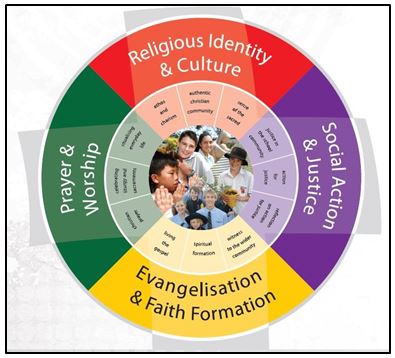St Joseph's Tobruk Memorial School Vision for Religious Education
The vision for Religious Education at St Joseph's Tobruk Memorial School, '…emphasises the two distinct yet complimentary dimensions of Religious Education' (BCE 2013). Religious Education aims to develop Religious Literacy so that our students can participate critically and authentically in contemporary culture. The Religious Life of the school embodies the faith community in which students are challenged to live the Gospel of Jesus Christ.
St Joseph's Religious Education Program embraces inquiry-based learning to develop critical thinking skills with clear, visible learning intentions. Children are encouraged to view their world critically in the light of deep Catholic tradition and quality teaching.
The community of St Joseph's recognises and celebrates the diversity of our students, encouraging and supporting the development of a child's faith and spirituality through the Religious Life of the School as influenced by our co-founders St Joseph, St Mary of the Cross Mackillop, and the Rats of Tobruk.
Gospel values permeate our entire school program and are not merely taught in a Religious Education lesson. Our community celebrates seven (7) core values based on the charisms of our founders: dignity, compassion, courage and resilience, justice, camaraderie, reconciliation, and trust and faith in God.
Our goal as religious educators is to develop religious literacy within our students whilst providing an environment for ongoing faith formation. Within an authentic faith community, where the catholic culture is expressed and embedded in the life of the school, the students of St Joseph develop the knowledge, understanding and skills to make connections with catholic teaching and the world in which they live.
The Religious Education Curriculum
The curriculum area of Religious Education is taught in accordance with the Religious Education Archdiocese of Brisbane Curriculum, P-12. Religious Education at St Joseph's Tobruk Memorial School seeks to develop the religious understanding of students in light of the Catholic Christian tradition so that they might participate authentically in contemporary life.
The Religion Curriculum has four strands. Each of these strands comprises three distinct yet interrelated sub-strands:
- Sacred Texts: Old Testament, New Testament, and Christian Spiritual Writings and Wisdom.
- Beliefs Trinity: God, Jesus the Christ, Spirit; Human Existence; and World Religions.
- Church: Liturgy and Sacraments, People of God, and Church History.
- Christian Life: Moral Formation; Mission and Justice; and Prayer and Spirituality.
© Brisbane Catholic Education,
Catholic Identity Team (2023)
Religious Education Learning & Teaching Overview >>
P-6 Overview of Religious Education Teaching & Learning Cycles >>
The Religious Life of the School
The Religious Life of the School P-12 is focused on the second dimension of Religious Education, commonly referred to as “teaching people to be religious in a particular way" (Moran, 1991).
The Religious Life of the School P-12 comprises four interrelated components. Each of these strands comprises three distinct yet interrelated sub-strands:
- Religious Identity and Culture: developing the school's ethos and charism; building an
authentic Christian community; and creating a sense of the sacred.
- Evangelisation and Faith Formation: living the gospel; spiritual formation; and witness to the wider community.
- Prayer and Worship: Christian prayer; celebrating liturgy and sacraments; and ritualising everyday life.
- Social Action and Justice: justice in the school community; action for justice; and reflection on action for justice.
Religious Life of the School Overview >>

© Brisbane Catholic Education, Catholic Identity Team (2023)